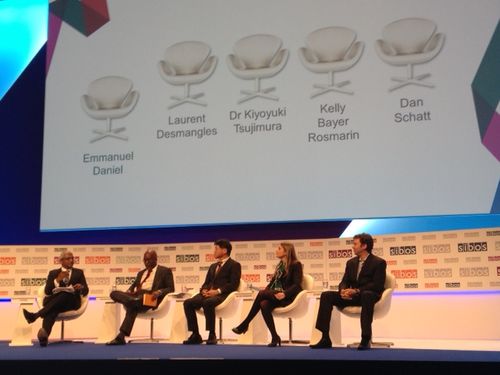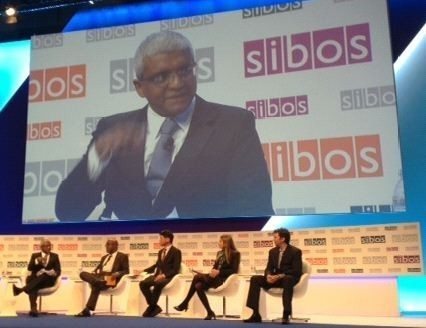
So, at the end of a very long third day of SIBOS, I attended
the final session on mobile payments which began with Laurent Desmangles of the
Boston Consulting Group (BCG) presenting some slides on their view of how the
mobile space is developing.
Laurent quite rightly made the assertion that cards would
still be around in five years or so, as only 87% of merchants will have NFC
terminals by 2020. That sounds like a
lot but, in the USofA, that is the same number as Discover cardholders, and Discover
cardholders keep Visa and MasterCard in their pockets and purses as 87% is not
good enough. You need 99.9%
Laurent’s opening led into the full panel debate which
included:
- Kelly
Bayer Rosmarin, Business Product and Development, Commonwealth Bank of
Australia - Dan
Schatt, GM Financial Innovations, PayPal - Dr
Kiyoyuki Tsujimura, President and CEO, DOCOMO Engineering Inc
and chaired by some chap from the Asian Banker, called
Emmanuel Daniel.

The main reason I was there was to hear from Kelly Baker
Rosmarin of Commonwealth Bank of Australia (CBA), who launched Kaching last
year, and Dr. Kiyoyuki Tsujimura of NTT DoCoMo, the pioneers of mobile
payments, so here are my highlights (impressions, not accurate quotes).
As Tsujimura-san noted, NTT has eight years of mobile
payment experience, which is way ahead of anyone else I know.
They have 120 million NTT customers and 60% are using mobile
payment enabled handsets. OF those, 60% are
using mobile payments at least one a week, which means that around 50 million
Japanese people are making a mobile payment on a regular basis.
That’s phenomenal.
They use it for convenience and financial benefits as the
merchants are issuing ecoupons at the point of sale (POS) with additional discounts
if they use mobile payments. Merchants
also like it, as they have no cash to deal with, and they can get 1:1 marketing
benefits by having the customer’s mobile details.
NTT also provide money transfer via mobile, but it’s not
competitive with banks as money transfer is limited to a maximum of 120,000 yen
(about £1,000 or $1,600) in a single transaction.
When asked why mobile payments had succeeded in Japan,
Tsujimura-san said that “we are the largest operator in japan with 50% market
share in mobile, so we set the standard for how customers deal with mobile payments”.
In a fairly typical Japanese statement
of the world, he then asserted that “we are leading how customers use mobile
payments”.
If only our banks would do the same!
Next up was Kelly Bayer Rosmarin from CBA to talk about Kaching.
Talking about why a bank would lead customers into mobile
payments, Kelly stated that: “people have an intimate relationship with their
money, and they trust their bank with that relationship, and so we should own
that relationship with their money”.
Yes, I agree, although ‘owning a relationship’ is always questionable.
Kelly then underscored how things had changed in the
relationship when she said that: “the month before last, more than fifty percent
of people were doing their banking with the CBA with a mobile, compared with just
ten percent just two years ago.”
Wow! She made it clear
that this means that most of their bank transaction are through mobile today,
rather than internet, ATM or other channels.
That’s rapid fire change.
Why did they do this?
“Our customers are already mobile and we have to be where our customers
are”. Simple.
In a similar way to Square, the real secrete of mobile
success through merchant acquisition. You
have to have the retail POS enabled for mobile before mobile will succeed, and
CBA is the largest Australian bank in terms of merchant acquiring. They have led the roll-out of merchant NFC
payments, but not using a standard terminal as there was no generic NFC POS out
there that suited the customer experience they wanted to deliver, so they
developed their own.
I first heard about this last month at Next Bank Europe, and
found that the CBA NFC POS (how many acronyms can I throw in here!) is one of
the best. If you haven’t seen it, take a
look:
Next up was industry incumbent (they are no longer
upstart!), PayPal. Dan Schatt, General
Manager of Innovation, talked about various aspects of their service and honed
in on money transfer as a key opportunity for banks in the mobile space, in a
similar way to NTT’s experience.
“Banks have a very small share of the global money transfer
market”, Dan said. “Today, it’s about 30% whereas, a few years ago, it was more
like 100%. We’re helping banks get that
back from Western Union and others.”
Good for you Dan, the banks’ friend.
After tackling remittances, Dan identified two other markets
worth over a trillion dollars each: cash and cheques.
Dan made clear that “if you can make the experience of using
your mobile banking app as easy as handing over cash, that’s an inflexion point
when people will be more likely to use an electronic payment more than a
physical payment”.
So mobile can cannibalise cash and cheques. I hope so, and Square is doing this already. When asked what he thought of Square, Dan was
quite dismissive: “we are and we always have been a digital wallet; square is
just a dongle”.
Hmmm … I’m going to watch that space.
Emmanuel then got into an area that is my personal hobby
horse: is NFC relevant or is it a technology past its time already?

Dan was polite to start with: “NFC really solves problems
for the retailer or is it a solution looking for a problem. Things are changing
so quickly, because if you look at all the infrastructure providers serving
these retailers, they’re all going onto the internet. You no longer have to run
things over legacy standards or wiring as a result, and you can do it in a very
secure way. When we started rolling out
to large retailers in the USA, we had a card that is actually a token, but we
now find that 83% of people using PayPal at a POS are using a mobile and a pin
and not the card. The card networks
insist that you need something in your hand, but that’s not the case.”
In other words, Dan is saying NFC is dead. What about Kelly?
“With so much fighting going on between providers, NFC has
missed its chance. Cloud will take over rapidly and NFC will have been strangled
at birth.”
Nice one Kelly, so that’s that.
After the mobile payments session, it was off to party and
did we party? We sure did!
Would tell all but the bank swore me to secrecy, threatening
me with a politically exposed person order if I blogged about what happened.
That’s fine, as I was already an exposed person when they
threatened this!
Will tell all at some point this week.
Anyways, today is an innotribe day with Muhammad Yunus of
Grameen Bank and more. Should be a great
day. See you later …
Chris M Skinner
Chris Skinner is best known as an independent commentator on the financial markets through his blog, TheFinanser.com, as author of the bestselling book Digital Bank, and Chair of the European networking forum the Financial Services Club. He has been voted one of the most influential people in banking by The Financial Brand (as well as one of the best blogs), a FinTech Titan (Next Bank), one of the Fintech Leaders you need to follow (City AM, Deluxe and Jax Finance), as well as one of the Top 40 most influential people in financial technology by the Wall Street Journal's Financial News. To learn more click here...




















